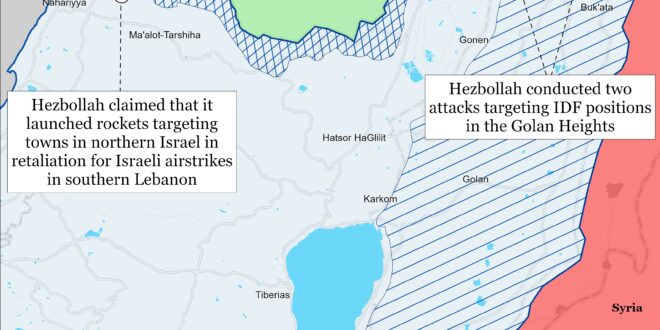Western media reported on March 7 that the United States will establish a temporary port in the Gaza Strip to facilitate the flow of humanitarian aid.[i] US President Joe Biden is expected to announce the project during his State of the Union address on March 7. White House officials disclosed that the United States plans to build a temporary port off the coast of the Gaza Strip before moving the structure closer to shore. Western reporting noted that the project would require up to thousands of US service members stationed off the Mediterranean coast. Palestinian militias have previously condemned US humanitarian efforts in the Gaza Strip as insufficient and creating chaos.[ii] CTP-ISW will follow up with additional details on the proposed temporary port in future updates.
Iranian military and security leaders are increasingly discussing the need to expand the Iranian military presence around the Red Sea and Mediterranean Sea. Major General Yahya Rahim Safavi—a senior military adviser to the Iranian supreme leader—stated on March 6 that the Islamic Revolutionary Guards Corps (IRGC) Navy and Aerospace Force should “focus” on the Red Sea and Mediterranean Sea.[iii] Safavi described the Mediterranean Sea as part of Iran’s strategic depth and that Tehran must accordingly “increase [its] strategic depth [by] 5,000 kilometers,” which would extend to the Strait of Gibraltar.[iv] Safavi’s remarks come after IRGC Coordination Deputy Brigadier General Mohammad Reza Naghdi threatened in December 2023 that Iran’s so-called “Axis of Resistance” could someday disrupt maritime traffic in the Mediterranean Sea and around the Strait of Gibraltar.[v] The Iranian desire to develop a military presence, especially a naval one, around the Mediterranean Sea and its periphery is not entirely new, as senior military officials have discussed the idea since at least 2016.[vi]
The remarks from Safavi and Naghdi are noteworthy, nevertheless, given recent Iranian efforts in the area. Western media reported on March 3 that Iran requested Sudanese permission to establish a permanent naval base on the Red Sea, which would support Iranian out-of-area naval operations and attacks on international shipping.[vii] Separately, Israel was likely responsible for an airstrike that killed an IRGC Navy colonel around the coastal city of Baniyas, Syria, on March 1.[viii] An Israeli social media account observed that the naval officer may have worked on coastal missile defenses and/or electronic warfare.[ix]
Iran would probably use an expanding military presence around the Red Sea and Mediterranean Sea to threaten commercial traffic, as Iran has long done so around the Persian Gulf and is currently supporting Houthi attacks on global commerce. Iran has invested in recent years in building surface vessels that are capable of hosting fast attack craft, drones, helicopters, and missiles. These vessels would not likely survive conventional engagements against the US Navy or other modern militaries—but they are optimized for the sort of commerce raiding that has long been a feature of Iranian regional strategy.
The Islamic Resistance in Iraq—a coalition of Iranian-backed Iraqi militias—appears to have refocused its attacks to target primarily Israel rather than US forces for the moment. The group has claimed four attacks targeting Israel in the first week of March, compared to three attacks targeting Israel in the month of February.[x] The group has contrastingly not claimed any attacks targeting US forces since February 4.[xi] The Islamic Resistance in Iraq described its three most recent attacks as part of the “second phase of operations to. . . support our people in Gaza.”[xii] Iranian-backed Iraqi militia leaders have praised the Islamic Resistance in Iraq attack targeting Kiryat Shmona Airport on March 6 as the beginning of this second phase, which involves targeting Israeli airports and ports.[xiii] The Islamic Resistance in Iraq released a statement on March 6 stating that it means to expel US forces from Iraq and support Palestinian militias by continuing attacks targeting Israel until there is a ceasefire in the Gaza Strip.[xiv]
- The Islamic Resistance in Iraq claimed three drone attacks targeting industrial and military locations inside Israel on March 5-7.[xv] The IDF reported on March 4 that it intercepted a drone entering from Syria.[xvi] The Islamic Resistance in Iraq claimed three attacks in February 2023 targeting unspecified Israeli targets near Eilat, the Golan Heights, and the Dead Sea.[xvii]
- Kataib Sayyid al Shuhada Secretary General Abu Alaa al Walai called for a second phase of attacks targeting Israel on January 23.[xviii] Walai specifically called for targeting Israel’s ports. The Islamic Resistance in Iraq claimed on March 3 that the group launched drones targeting the Haifa port.[xix] Israeli journalists reported that the IDF intercepted a drone near Haifa on February 29.[xx]
The Islamic Resistance in Iraq claimed on March 7 that it launched drones targeting an IDF military airport near Safed, Israel.[xxi] The Syrian Arab Army (SAA) separately claimed on March 7 that it intercepted a drone that resembles drones previously launched by the Islamic Resistance in Iraq.[xxii] A Syrian social media account stated that the intercepted drone was an Iranian-made Shahed-101 and speculated that the SAA could have intercepted the drone by mistake.[xxiii]
Key Takeaways:
- Gaza Strip: Western media reported that the United States will establish a temporary port in the Gaza Strip to facilitate the flow of humanitarian aid.
- Iran: Iranian military and security leaders are increasingly discussing the need to expand the Iranian military presence around the Red Sea and Mediterranean Sea.
- Southern Lebanon and Golan Heights: The Islamic Resistance in Iraq appears to have refocused its attacks to target primarily Israel rather than US forces for the moment.
- West Bank: Unidentified Palestinian fighters detonated a vehicle-borne improvised explosive device targeting Israeli forces around Tubas.
- Iraq: Former Iraqi Prime Minister Nouri al Maliki said that the Iranian-backed Iraqi militias must refrain attacking US forces so that Baghdad can negotiate a timeline for the US withdrawal.
- Yemen: Houthi-affiliated media claimed that the United States and the United Kingdom conducted two airstrikes targeting Hudaydah.
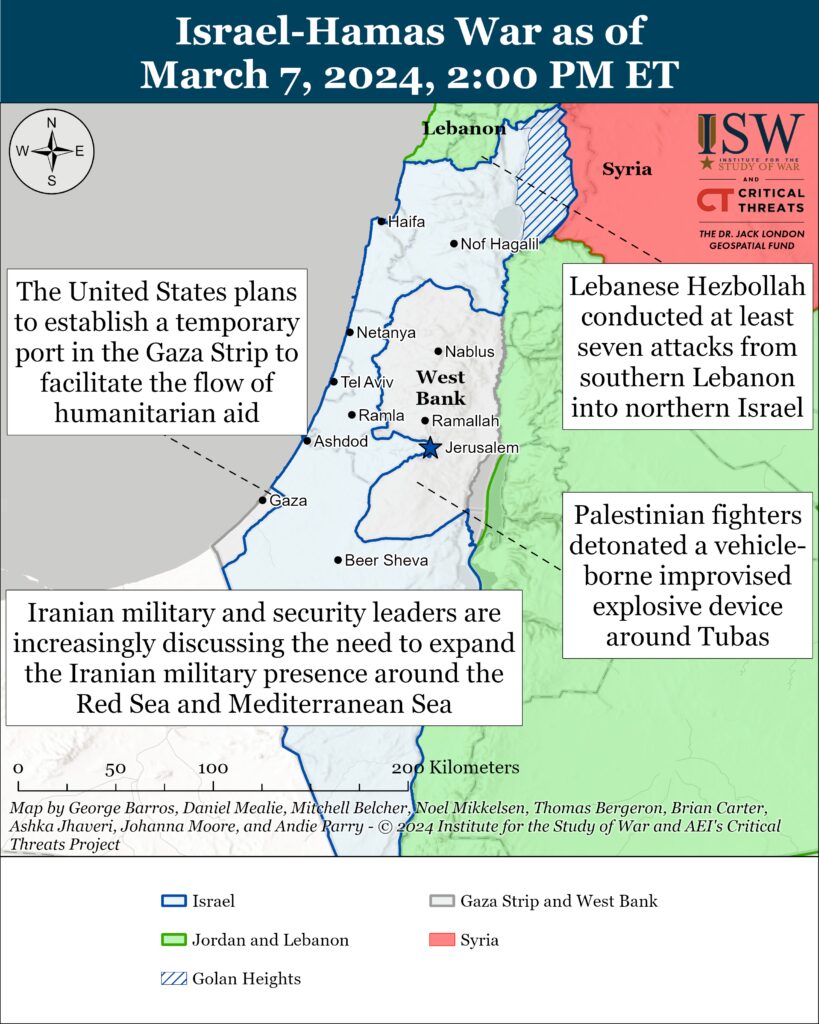
Gaza Strip
Axis of Resistance campaign objectives:
Erode the will of the Israeli political establishment and public to launch and sustain a major ground operation into the Gaza Strip
Degrade IDF material and morale around the Gaza Strip.Palestinian militias continued to claim attacks on Israeli forces in the Zaytoun area of southern Gaza City on March 7. Palestinian Islamic Jihad (PIJ) targeted Israeli armor operating in Zaytoun with an improvised explosive device (IED).[xxiv] PIJ also mortared Israeli infantry on Road 10 in southern Zaytoun.[xxv]The Israel Defense Forces (IDF) concluded a two-week-long operation in Zaytoun on March 2 to re-clear Palestinian fighters there.[xxvi] Palestinian militia attacks may be targeting semi-permanent Israeli checkpoints in southern Gaza City or Israeli forces building an east-west road in between Gaza City and the central Gaza Strip rather than forces actively clearing the northern Gaza Strip.[xxvii] Ongoing Palestinian attacks in the area suggest that Israeli forces did not fully clear Zaytoun and that Palestinian militias in southern Gaza City retain some capacity to fight.
The IDF Nahal Brigade (162nd Division) killed at least 10 Palestinian fighters in the central Gaza Strip on March 7.[xxviii] The brigade directed an airstrike on a squad loading military equipment and ammunition on a vehicle near Israeli forces.
Israeli forces continued to conduct clearing operations in northern Khan Younis on March 7. The IDF Maglan and Egoz units (89th Commando Brigade) and the IDF Navy Shayetet unit conducted “secret and precise” raids in Hamad. The Commando forces clashed with and detained Palestinian fighters in high-rise towers in Hamad. The IDF 7th Brigade (36th Division) raided militia infrastructure in Hamad, including Hamas offices, tunnel shafts, and a weapons factory.[xxix] The IDF Bislamach Brigade killed six Palestinian fighters entering a building known to house Hamas infrastructure in Qarara.[xxx]
Palestinian militias continued to defend against Israeli clearing operations in Hamad, northwestern Khan Younis. Three militias conducted ambushes with explosive devices targeting Israeli armor and dismounted infantry operating in Hamad.[xxxi] Hamas detonated a building rigged with anti-personnel IEDs targeting over 20 Israeli soldiers on March 6.[xxxii] PIJ claimed a nearly identical attack on March 7.[xxxiii] Democratic Front for the Liberation of Palestine targeted Israeli armor with an IED in Hamad on March 7.[xxxiv] The al Aqsa Martyrs’ Brigades, the self-proclaimed military wing of Fatah and aligned with Hamas in the war, claimed two additional clashes with Israeli forces in Hamad.[xxxv]
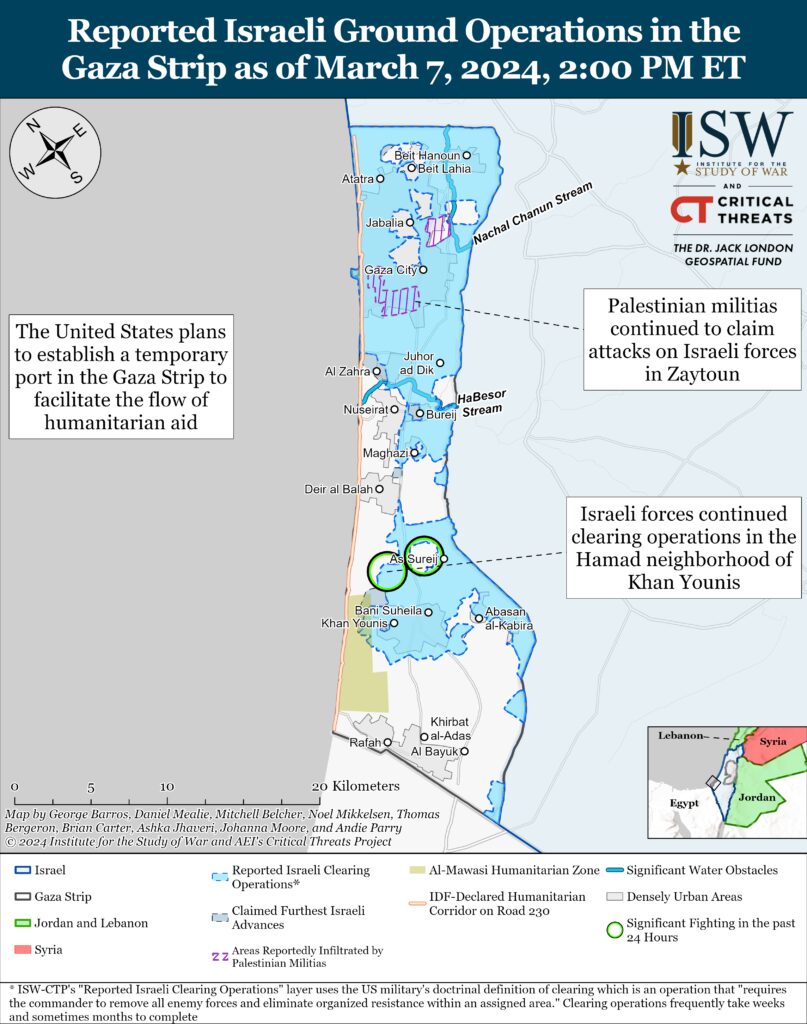
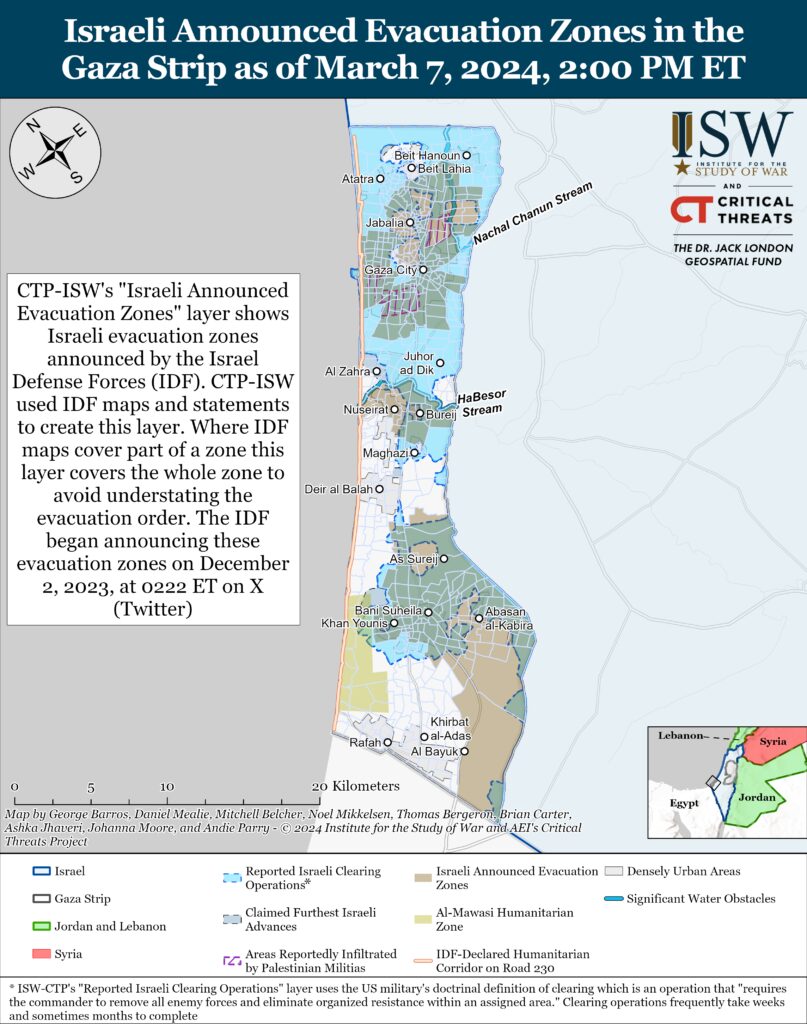
Cairo-based ceasefire talks concluded on March 7 without an agreement. A senior Hamas official stated that Israel rejected on March 7 Hamas’ ceasefire counterproposal, which required a full Israeli withdrawal from the Gaza Strip, a permanent ceasefire, and the return of displaced Gazans without restrictions.[xxxvi] Hamas confirmed its delegation left Cairo on March 7.[xxxvii] Unspecified senior Biden administration officials blamed Hamas for holding up a proposed six-week ceasefire deal by refusing to release the ”vulnerable“ category of hostages whom it holds in the Gaza Strip.[xxxviii] This breakdown in talks indicates that a deal is unlikely to be reached before the March 10 deadline that high-level Israeli officials set to reach a deal before conducting an offensive into Rafah.[xxxix] Israeli officials have signaled since February 18 that the IDF may delay its operation into Rafah to evacuate the displaced civilians currently sheltering there.[xl] Israeli Prime Minister Benjamin Netanyahu reaffirmed on March 7 his intent to expand Israeli operations into Rafah.[xli]
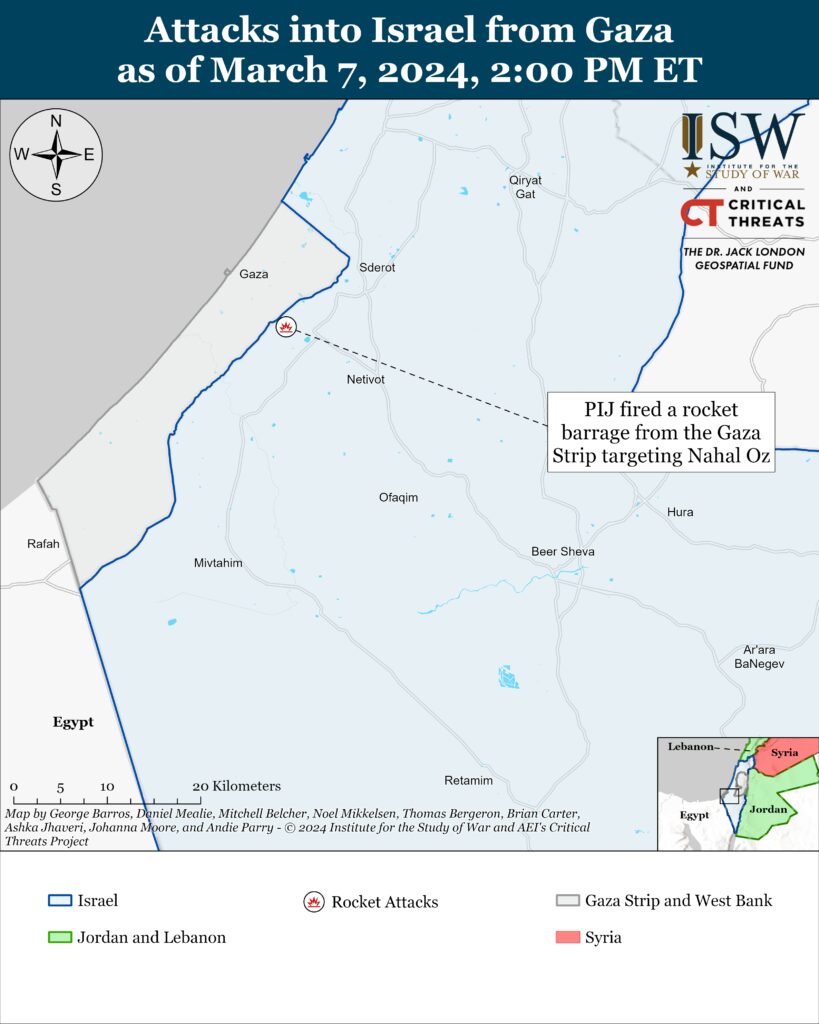
PIJ fired a rocket barrage from the Gaza Strip targeting Nahal Oz on March 7.[xlii]
West Bank
Axis of Resistance campaign objectives:
Draw IDF assets and resources toward the West Bank and fix them thereIsraeli forces have clashed with Palestinian fighters at least five times in the West Bank since CTP-ISW’s last data cut off on March 6.[xliii] The IDF detained 29 wanted individuals in the West Bank overnight.[xliv]
Unidentified Palestinian fighters detonated a vehicle-borne improvised explosive device (VBIED) targeting Israeli forces around Tubas on March 7.[xlv] This event marks the second VBIED attack that CTP-ISW has recorded in the West Bank since the Israel-Hamas war. Palestinian media posted footage on January 5 showing a VBIED detonate in Nour Shams refugee camp in Tulkarm.[xlvi] These attacks suggest the presence of a VBEID factory in the northern West Bank.
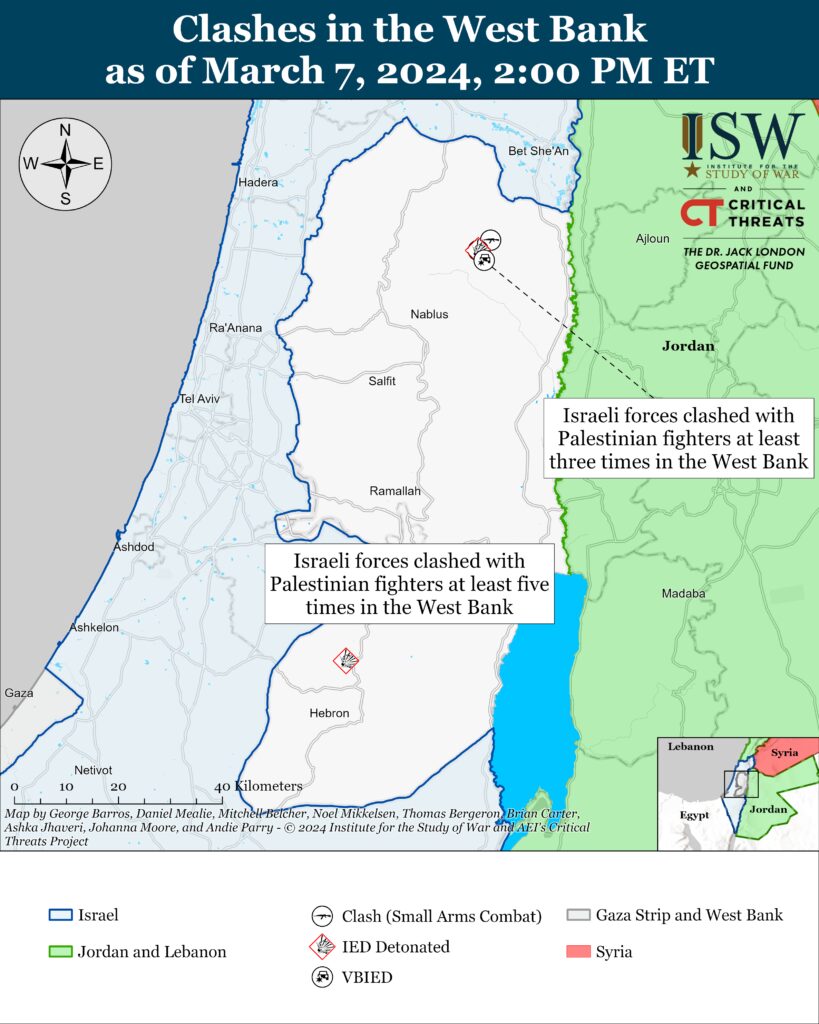
This map is not an exhaustive depiction of clashes and demonstrations in the West Bank.
Southern Lebanon and Golan Heights
Axis of Resistance campaign objectives:
Draw IDF assets and resources toward northern Israel and fix them there
Set conditions for successive campaigns into northern IsraelLebanese Hezbollah conducted at least seven attacks from southern Lebanon into northern Israel on March 7.[xlvii] Hezbollah conducted at least two attacks
targeting IDF bases in the Golan Heights.[xlviii] Israeli media reported that Hezbollah is using its indirect fire attacks to test Israeli air defenses and identify the location of Iron Dome batteries.[xlix]
Hezbollah separately claimed that it conducted two attacks targeting towns in northern Israel in retaliation for Israeli airstrikes in southern Lebanon.[l] The IDF targeted Hezbollah observation posts and unspecified military infrastructure near the Israel-Lebanon border on March 6.[li]
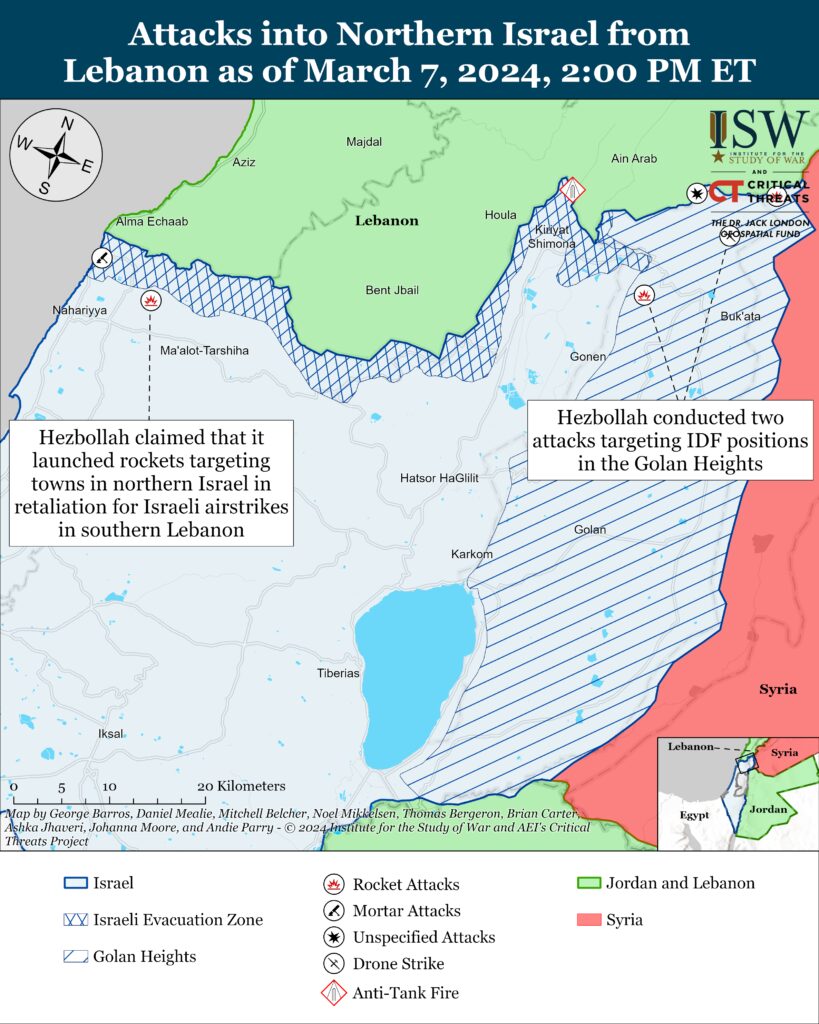
Recorded reports of attacks; CTP-ISW cannot independently verify impact.
Regional Indirect Fire
Recorded reports of attacks; CTP-ISW cannot independently verify impact.
Iran and Axis of Resistance
Axis of Resistance campaign objectives:
Demonstrate the capability and willingness of Iran and the Axis of Resistance to escalate against the United States and Israel on multiple fronts
Set conditions to fight a regional war on multiple frontsFormer Iraqi Prime Minister Nouri al Maliki said that the Iranian-backed Iraqi militias must refrain from renewing their attack campaign against US forces in Iraq so that the Iraqi federal government can negotiate a timeline for the US withdrawal.[lii] Neither the Islamic Resistance in Iraq nor any Iranian-backed Iraqi militias have claimed any attacks targeting US forces in Iraq since February 4.[liii] The United States and Iraq have held a series of ”working group” meetings since January 2024 to discuss the International Coalition’s mission in Iraq as well as to present an assessment of the capabilities of Iraqi Security Forces and of the threat posed by ISIS.[liv] These meetings are a precursor to negotiations that Baghdad seeks to use to transition from a multilateral security relationship between Iraq and the International Coalition to unspecified bilateral relationships between Iraq and individual coalition member countries.[lv]
The Popular Mobilization Forces (PMF)-controlled Muhandis General Company signed a memorandum of understanding (MOU) with the Chinese National Machinery Industry (SINOMACH) on March 7.[lvi] The MOU encompasses reconstruction, engineering, trade services, and energy-related projects across multiple Iraqi provinces. SINOMACH is a Chinese state-owned company whose business activities encompass heavy machinery manufacturing, overseas infrastructure construction, and financial services. SINOMACH has been contracted by the Iraqi federal government for multiple construction projects for oil and gas facilities in Basra and Baghdad.[lvii]
The Muhandis General Company was established in February 2023 and is nominally under the control of the PMF.[lviii] PMF Chairman Faleh al Fayyadh is the signatory of the Muhandis General Company’s articles of incorporation and was seen at a ceremony for the company with PMF Chief of Staff Abdul Aziz al Mohammadawi.[lix] The Muhandis General Company is modeled after the IRGC’s parastatal organization Khatam ol Anbiya Construction headquarters, an engineering and development firm that oversees large-scale construction projects and helps Iran circumvent sanctions.
Iraqi Parliamentary Security and Defense Committee member Yasser Iskandar claimed that Iraq must strengthen its air defense capabilities to eliminate vulnerabilities in Iraqi security.[lx] Iskandar said that air defense capabilities are necessary to prevent violations of Iraqi airspace. He also claimed that the United States has prevented Iraq from developing air defense capabilities to retain its own freedom of movement.
Houthi-affiliated media claimed that the United States and the United Kingdom conducted two airstrikes targeting Hudaydah on March 7.[lxi] US CENTCOM separately acknowledged airstrikes targeting two Houthi unmanned aerial vehicles inside Houthi-controlled Yemen on March 6.[lxii]
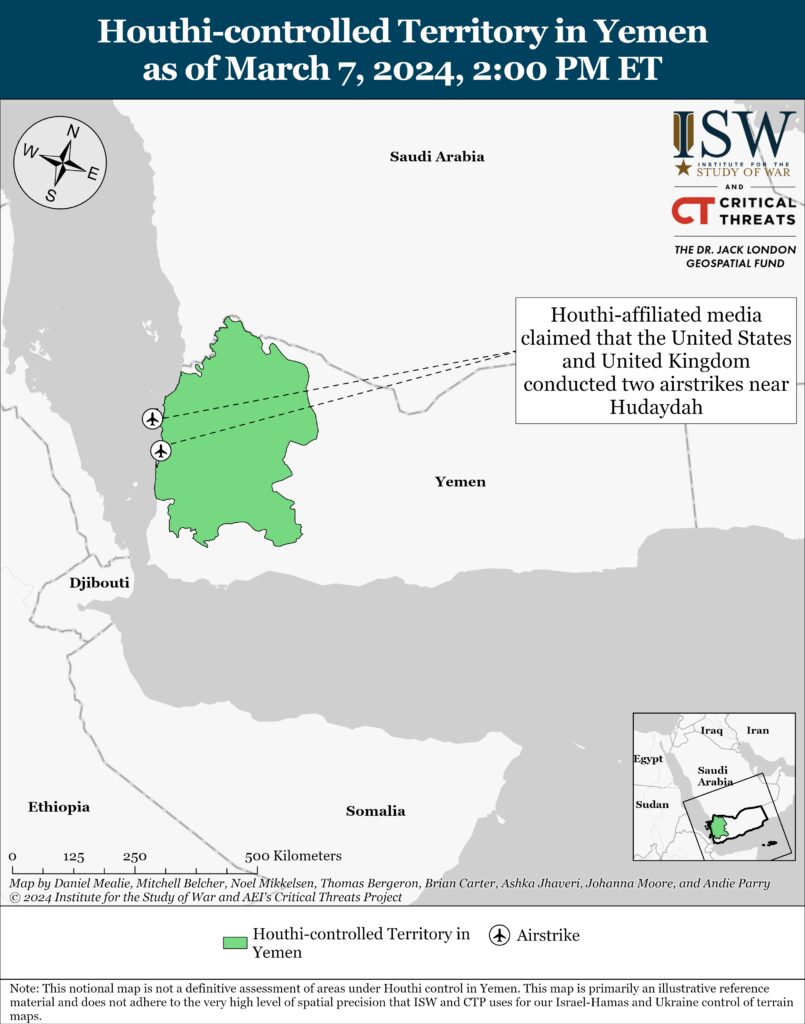
Iranian Foreign Affairs Minister Hossein Amir Abdollahian discussed the Israel-Hamas war in a meeting of the Organization of Islamic Cooperation (OIC) in Jeddah on March 5.[lxiii] Abdollahian called on Muslim countries to pressure Israel and the United States to end the Israel-Hamas war. Abdollahian blamed the United States for prolonging the war by vetoing resolution calling for a ceasefire on the UN Security Council.
Armenian Defense Minister Suren Papikyan continued his official visit to Tehran to discuss regional security cooperation on March 7.[lxiv] Papikyan met with Iranian President Ebrahim Raisi after having previously met with Iranian Defense Minister Brigadier General Mohammad Reza Gharaei Ashtiani on March 6.[lxv] Raisi reiterated his criticism regarding alleged extra-regional interference in the Caucasus, referring to the long-held Iranian assertion that Israel and Turkey are expanding their geopolitical influence there via Azerbaijan.[lxvi] The Iranian regime has historically accused Baku of allowing Israel to use Azerbaijani territory to launch operations against Iran.[lxvii] Iran has provided security assistance, including drone sales, to Armenia previously as part of its effort to contain Azerbaijan.[lxviii] Papikyan may have been further discussing increased cooperation with Iranian officials on March 6 and 7.
 Eurasia Press & News
Eurasia Press & News
